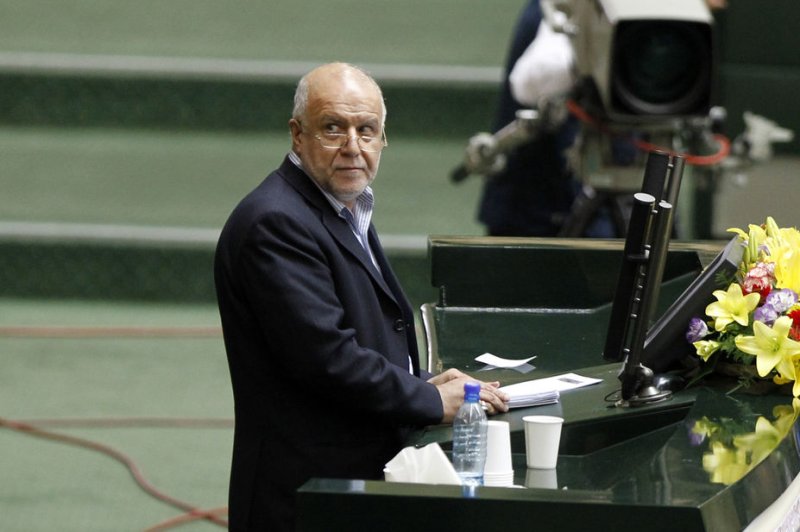Iranian Oil Minister Bijan Zanganeh proposes an extraordinary OPEC meeting to address parties producing more than they should be under the terms of a multilateral agreement. File Photo by Maryam Rahmanian/UPI |
License Photo
Aug. 8 (UPI) -- Iran's oil minister on Wednesday sent a letter to the OPEC secretary-general to raise concern about member states violating the terms of a production agreement.
Without referencing a specific country, Oil Minister Bijan Zangeneh said he was frustrated that some parties to a multilateral agreement to keep supplies in check with expected demand through production controls were skirting their obligations.
The latest survey from S&P Global Platts found five members of the Organization of Petroleum Exporting Countries were producing more oil in July. Saudi Arabia, the de facto leader of OPEC and one of Iran's main adversaries, produced 10.6 million barrels per day, about 30,000 barrels per day below its all-time high in August 2016.
Algeria, Iraq, Kuwait and the United Arab Emirates all produced at the highest level since December 2016, just before implementation of the production agreement.
In his letter to OPEC Secretary-General Mohammad S. Barkindo, Zangeneh called for special consideration of the production trends. While a joint monitoring committee is keeping tabs on the initial agreement, there's no monitoring of revisions made in June.
"The issue should be raised at an extraordinary meeting of the OPEC Conference for decision making," his letter read.
OPEC ministers and contributing non-member states agreed in June to pull compliance with the production deal closer to 100 percent. Parties were above 100 percent this year, in part because of chronic production woes in Venezuela.
In a June letter to his Saudi counterpart, Khalid al-Falih, Zangeneh said Riyadh was moving against the OPEC tide with pledges of more production. Only decisions made unanimously by OPEC on production were valid and Saudi Arabia was acting on its own, he said.
Zanganeh's latest pressure on OPEC comes as it faces isolation because of the impact of U.S. sanctions. Financial restrictions were imposed this week and Iran's oil will be targeted directly in November.
Speaking to newspaper Iran Daily, Iranian Foreign Minister Javad Zarif said completely cutting off Iran from the global oil market was unlikely.
"[The] Americans made a meaningless claim saying they seek to reduce Iran's oil exports to zero, which is impossible," he was quoted as saying. "The countries currently the U.S. is negotiating with have told Washington that they will continue their oil purchases from Iran."
The European Commission has enacted blocking statutes to protect companies still doing business with Iran, though U.S. President Donald Trump said they'd be cut off from the U.S. market if they continued to engage with the Islamic republic.















